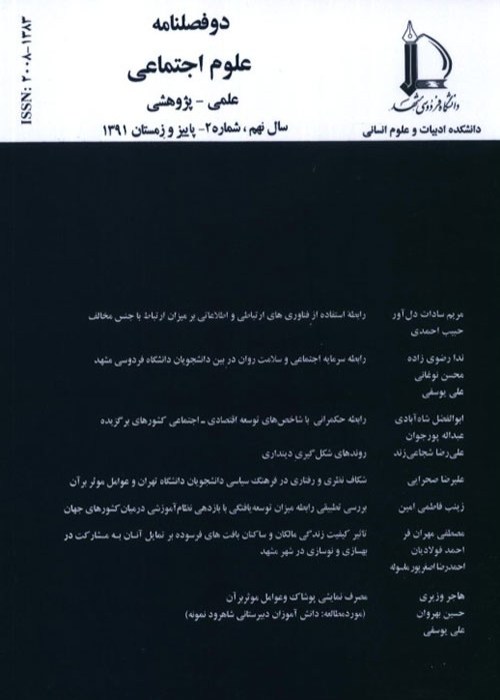The Relation of Group Structure with its Conflicts in University Departments
Author(s):
Abstract:
Introduction
Group dynamics study has been one of sociologist's and social psychologists old concerns. Unfortunately most studies which have been done, are social psychological or educational and sociologists have neglected this issue because of concern for macro structures. Another problem is related to the lack of empirical studies related to this issue. Studies about group dynamics should be of importance to Iranian sociological studies. This study has been designed meeting this aim and tries to study conflicts within university departments members and its relation with group structure.Theoretical Framework: Based on some theoretical view points such as incongruence theory, similarity attraction paradigm, trust theory, information processing perspective, dual goal concern theory, self-categorization theory and coalition theory, a theoretical model was created. Based on incongruence theory, if incongruence between members increases then probability of smooth and steadily co-working between individuals decreases. Also, based on Moreland and Levine, the number and the type of individuals in a group may impact on the events in the group. According to similarity attraction paradigm individuals which have common values may interpret the events in the same manner which itself can decrease intra-group conflicts. Trust theory presupposes that high levels of trust, probably is concomitant with low levels of dysfunctional conflict. Meanwhile, low levels of trust will probably be concomitant with high levels of conflict. The main claim of information processing perspective is that dysfunctional conflict appears among groups and teams which cognitive disagreement has been interpreted as criticism. Group members avoid information sharing, have low levels of decision making quality and the members who are not committed to group decisions, have no tendency to see the decisions practical. Dual goal concern theory assumes that conflict behavior has been determined by two stimuli: intention to individual or the to the others goals. Conflict is seen as win/loss situation, intimidation to gain conformity with personal views. In self-categorization theory, the more the individual belongs to the group, the more is their relations intimate and so the less conflict will exist. Coalition theory claims that individuals by forming coalitions mobilize group members against each other and impel neutral members to support one side. Independent variables based on these theories include: Multiplicity of band and subgroups, increase of disciplines, weakness of trust among members (intra and inter group trust), generational contrasts, group size, higher education courses number and background differences. Intra group conflict was a dependent variable and other variables were independent ones.
Methodology
The method was survey and data gathered using a questionnaire designed by the researcher. Nearly most of questions were in Likert scale but some of other questions have also been enclosed.The population of study included department members of Bu Ali Sina and Kurdistan universities. All members who were willing to fill our questionnaire were questioned. Of 495 members, 357 people were questioned. The hypotheses are the following: There is a relationship between multiplicity of bands and subgroups and intragroup conflict.
Increase of disciplines inside group increases intragroup conflict.
Weakness of trust (intra and inter) is related with intragroup conflict.
Contrast between generations in the group has a significant relationship with intragroup conflict.
The more the group sizes the more intragroup conflict.
Number of higher education courses is related with intragroup conflict.
The more background differences the more intragroup conflict.
Results
Descriptive results show that Bu Ali Sina University has higher intragroup conflicts (mean of 6.5 in contrast to 5.1 of Kurdistan). Inter and intra group trust among Bu Ali Sina University members is higher than that of Kurdistan University.Hypothesis testing shows that multiplicity of bands and subgroups has not an impact on intragroup conflicts. Increasing disciplines within group increases the conflict. Regression analysis shows that this variable explains 7 percent of conflicts variance. Pearson Correlation testing of relationship between trust among members and intragroup conflicts shows a a positive relation (r=.44). Generation contrasts among members can also explain 14 percent of the dependent variable. Their relation is positive and in moderate level.
Group size has a positive effect on intragroup conflicts. But the number of higher education courses has no effect on the dependent variable. Age structure, ethnic and sex composition have also no effect on intragroup conflicts.
Conclusion
The study of intra group conflicts in Bu Ali Sina and Kurdistan universities shows that Bu Ali university has higher mean of conflicts than Kurdistan university. From trust view point, Bu Ali Sina University has also lower trust than Kurdistan. But the two universities have no significant differences about member's contrasts. So, Bu Ali Sina University managers need more effort to repair this low trust and consequently more conflicts. Encouraging members to do joint work and publishing joint papers can be one of factors which can reduce conflicts and increasing trust.Results showed that diversity of disciplines within group increases conflicts. So, for those groups which have discipline diversity, it is better to distinguish these disciplines to sub-groups. Approximating members value structures and providing common knowledge sources which are close to each other so that situations are not win/loss but win/win ones can be solutions to reduce conflicts.
Keywords:
Department , Intra , group conflict , Trust , Structure , University
Language:
Persian
Published:
Journal of Social Sciences, Volume:13 Issue: 1, 2016
Pages:
1 to 25
magiran.com/p1613204
دانلود و مطالعه متن این مقاله با یکی از روشهای زیر امکان پذیر است:
اشتراک شخصی
با عضویت و پرداخت آنلاین حق اشتراک یکساله به مبلغ 1,390,000ريال میتوانید 70 عنوان مطلب دانلود کنید!
اشتراک سازمانی
به کتابخانه دانشگاه یا محل کار خود پیشنهاد کنید تا اشتراک سازمانی این پایگاه را برای دسترسی نامحدود همه کاربران به متن مطالب تهیه نمایند!
توجه!
- حق عضویت دریافتی صرف حمایت از نشریات عضو و نگهداری، تکمیل و توسعه مگیران میشود.
- پرداخت حق اشتراک و دانلود مقالات اجازه بازنشر آن در سایر رسانههای چاپی و دیجیتال را به کاربر نمیدهد.
In order to view content subscription is required
Personal subscription
Subscribe magiran.com for 70 € euros via PayPal and download 70 articles during a year.
Organization subscription
Please contact us to subscribe your university or library for unlimited access!



